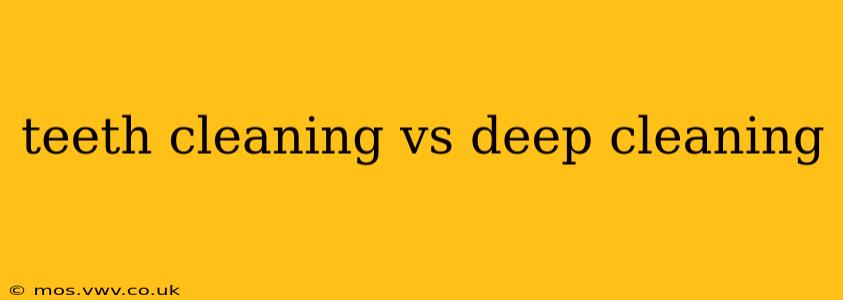Maintaining optimal oral health requires understanding the difference between regular teeth cleaning and a deep cleaning. While both are crucial for preventing gum disease and tooth decay, they differ significantly in their approach and purpose. This article clarifies the distinctions, helping you make informed decisions about your dental care.
What is a Regular Teeth Cleaning?
A regular teeth cleaning, also known as a prophylaxis, is a preventative procedure performed by a dental hygienist or dentist. It typically involves:
- Removing plaque and tartar: These sticky films accumulate on teeth, contributing to cavities and gum disease. The hygienist uses specialized tools like scaling instruments to scrape away these deposits.
- Polishing teeth: After removing plaque and tartar, teeth are polished to create a smooth surface, making it more difficult for plaque to adhere.
- Fluoride treatment (often): Fluoride helps strengthen tooth enamel and protect against decay. This is often applied as a gel or varnish during a cleaning.
- Oral health education: Your hygienist will provide personalized advice on brushing, flossing, and maintaining good oral hygiene practices.
Regular cleanings are recommended every six months, although this can vary depending on individual needs and risk factors. They are fundamental to preventing more serious dental problems.
What is a Deep Cleaning?
A deep cleaning, also known as scaling and root planing, is a more extensive procedure necessary for individuals with moderate to severe gum disease (periodontitis). It addresses the deeper pockets of infection that form between the gums and teeth during the progression of gum disease. This procedure typically involves:
- Scaling: This process removes plaque and tartar from both above and below the gum line, reaching areas inaccessible during a regular cleaning. Specialized instruments are used to carefully clean the root surfaces.
- Root planing: This step smooths the tooth roots to reduce bacterial buildup and promote healing of the gums. It helps to eliminate the rough areas where bacteria can easily accumulate.
- Post-treatment instructions: Following a deep cleaning, your dentist will provide specific instructions on how to care for your gums and teeth to prevent reinfection. This often involves meticulous oral hygiene practices and potential follow-up appointments.
Deep cleanings are not a one-time fix; they require ongoing maintenance through diligent home care and regular checkups to prevent the recurrence of gum disease.
How Often Should I Get a Deep Cleaning?
How often do you need a deep cleaning? This depends entirely on the severity of your gum disease and your response to treatment. Some individuals may only require a deep cleaning once, while others may need them more frequently to manage ongoing periodontal issues. Your dentist will determine the appropriate frequency based on your individual needs and the health of your gums.
What are the Signs I Need a Deep Cleaning?
What are the signs that you need a deep cleaning? Several warning signs indicate the potential need for a deep cleaning:
- Bleeding gums: This is a common early symptom of gum disease.
- Swollen or red gums: Inflammation of the gums is a clear sign of infection.
- Receding gums: This exposes more of the tooth root, making it vulnerable to decay and further infection.
- Persistent bad breath: This can be a symptom of underlying periodontal problems.
- Loose teeth: In advanced stages of gum disease, teeth may become loose and even fall out.
- Pus between your teeth and gums: This is a sign of infection in the periodontal pockets.
If you experience any of these symptoms, it's crucial to schedule an appointment with your dentist as soon as possible. Early detection and intervention are vital in managing gum disease and preserving your teeth.
What's the Difference in Cost Between a Regular Cleaning and a Deep Cleaning?
How much does a deep cleaning cost versus a regular cleaning? The cost of a deep cleaning is significantly higher than a regular cleaning because it is a more time-consuming and complex procedure. The exact cost varies based on several factors, including your location, the extent of the needed cleaning, and your insurance coverage. It’s always best to contact your dental practice directly to discuss the costs involved.
Can I Prevent the Need for a Deep Cleaning?
How can I prevent the need for a deep cleaning? Yes, you can significantly reduce your risk of needing a deep cleaning by practicing excellent oral hygiene:
- Brush your teeth twice a day: Use a fluoride toothpaste and a soft-bristled toothbrush.
- Floss daily: This removes plaque and food particles from between your teeth and under the gum line.
- Use mouthwash (optional): This can help kill bacteria and freshen breath.
- Visit your dentist regularly: Regular checkups and cleanings are crucial for early detection and prevention of gum disease.
- Maintain a healthy diet: Avoid excessive sugar and processed foods.
By following these preventative measures, you can significantly improve your chances of maintaining healthy gums and teeth, reducing the likelihood of requiring a deep cleaning.
This information is for general knowledge and does not constitute medical advice. Always consult with a dental professional for personalized recommendations regarding your oral health.
